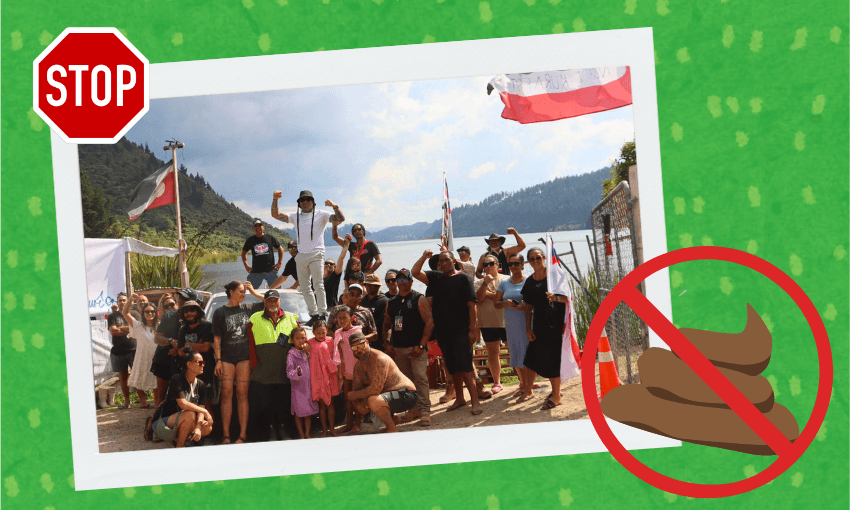A legal bid to stop Rotorua Lakes Council’s controversial sewerage pipeline near Lake Rotokākahi has failed, with the Environment Court saying the project is in the public’s interest. But opponents call it a desecration and are not giving up.
The Environment Court has dismissed a legal bid to stop Rotorua Lakes Council’s controversial sewerage pipeline near Lake Rotokākahi – prompting outcry from mana whenua, who say the ruling fails to protect one of the region’s most tapu bodies of water.
“The Environment Court, which is tasked with preserving the environment, has completely failed in its obligation to assist us in protecting the Rotokākahi environment with today’s ruling,” said Te Whatanui Leka Taumalolo Skipwith, Protect Rotokākahi spokesperson, in a statement released after the decision came out on Tuesday.
The ruling marks a pivotal moment in a saga that has seen protests, court action and police interventions around a pipeline designed to service Lake Tarawera communities by replacing failing septic tanks with a modern reticulated system. Now, the court has ultimately sided with the council, stating it had no doubt the sewerage reticulation project was in the public’s interest and improving the quality of freshwater in Lake Tarawera must be a given.
However, those standing in protection of Rotokākahi – an area where the bones of ancestors lie and considered wāhi tapu by local hapū Tūhourangi and Ngāti Tūmatawera – say the judgment feels like another chapter in the long history of development overriding Māori rangatiratanga.
In a blunt section of the decision, the court acknowledged the cultural offence of the “piping of paru through a tapu area” was considerable for the Māori community, but added that this offence “may not be so for the wider community”.
For Skipwith and many others, that difference cuts to the heart of the issue – little consideration of cultural values and indigenous sovereignty in how infrastructure projects are assessed.
Skipwith said the protectors were now “taking a closer look at the decision and will look to proceed to the High Court”.
He also expressed frustration at what he called the council’s “last-minute” recognition of the need for resource consent – a move that came just six weeks before the final Environment Court hearing. While the court acknowledged this delay was “very troubling”, it ultimately placed blame for the timing of the legal challenge on the applicants, stating, “a considerable amount of time was consumed in protests and injunction proceedings, rather than the pursuit of any action under the RMA”.
The pipeline at the heart of the dispute
The Tarawera Sewerage Scheme has been in development for nearly a decade, aiming to connect approximately 440 properties around Lake Tarawera to the public wastewater network via a 23km pipeline. The final 1.4km segment – along Tarawera Road and close to Rotokākahi – has become the focal point of opposition from mana whenua.
The council argues the project is essential for public health and environmental protection. Current septic tanks, they say, are leaching up to 252,000 litres of untreated effluent into groundwater and the lake each day. As of September 2024, the project’s estimated $29.32 million cost was partially funded by $6.5m from the Ministry for the Environment, $750,000 from the Bay of Plenty Regional Council, and $1.5m from the Rotorua Lakes Council. The remaining cost is to be covered by the 446 benefiting property owners, with each Tarawera household currently expected to pay between $38,000 and $42,000. However, the council will consult this month on whether to spread some of this cost across the wider district, which already contributes to operational and maintenance expenses through a targeted wastewater rate.
Despite acknowledging the spiritual significance of Rotokākahi, the council proceeded on the basis that the works did not require resource consent – a position the court has now upheld, albeit with reservations.
Since August 2023, mana whenua and supporters have staged peaceful protests at the site, including a 100-strong hīkoi and land occupations, and taken court action. The movement was surprised by a heavy police operation one night in February this year, when 80 officers cleared protesters to allow contractors onto the site. Seven people were arrested.
“This is a tohu that the desecration of Māori land will come with its own private protectors, paid for with your money,” one protester told media at the time.
The council also erected fences and installed cameras around the site – security measures that became symbolic of the hard line the project was taking. The costs of these measures, originally expected to be covered by the funding already provided from central and local government, may now fall to ratepayers.
Compromise or compliance?
In January, facing continued opposition, the council introduced a set of mitigation measures co-developed with some mana whenua representatives. These included: double-sleeving of the pipe near Wairoa Stream culverts, appointment of a pou tikanga, emergency protocols to alert mana whenua if the pipe failed, budgeting for remedial action, and a long-term cultural monitoring group.
While seen by some as a gesture of good faith, others argued these measures were mere window dressing to distract from a deeper issue: the route itself.
The court’s ruling may clear the legal path for the pipeline’s completion, but the spiritual and political battle is far from over.
“This decision does not end our obligations to our ancestors,” said Skipwith. “We will continue to oppose this pipeline, whether in courtrooms or on the whenua.”
The council may be nearing the end of its engineering timeline, but for those who call Rotokākahi sacred, the battle is only entering its next phase.
This is Public Interest Journalism funded by NZ On Air.





